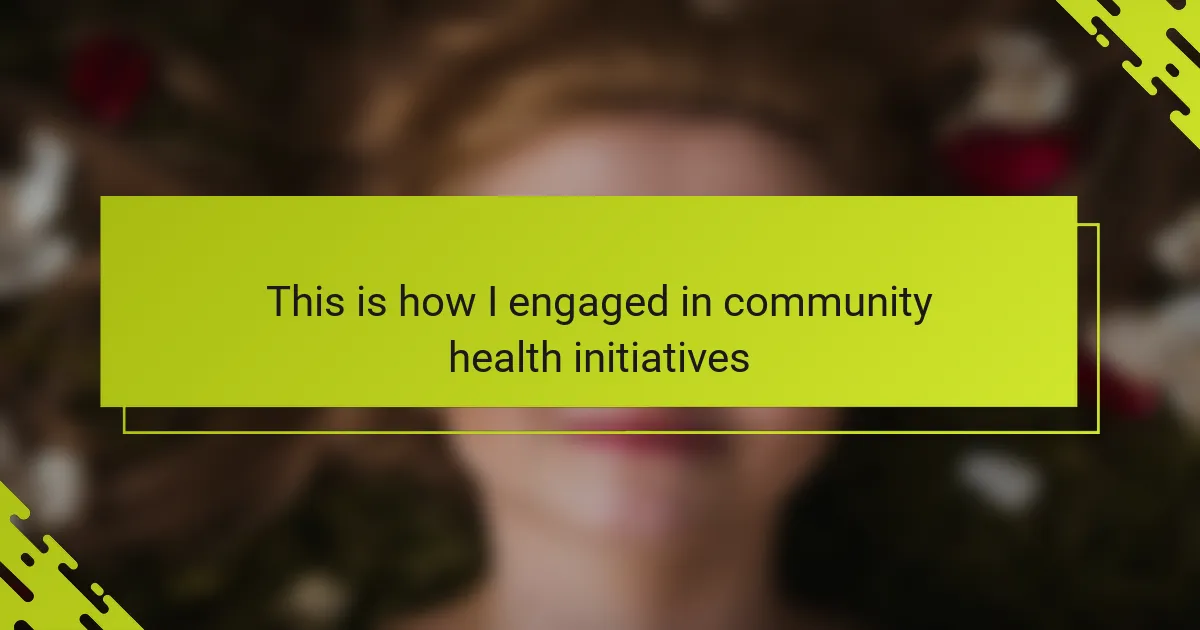Key takeaways
- Queer women culture fosters openness, resilience, and a strong sense of community, emphasizing the importance of shared experiences and support.
- Access to culturally competent healthcare is crucial, as many queer women face challenges such as invisibility and stigma in healthcare settings.
- Effective health initiatives require genuine relationship-building, intersectionality awareness, and flexibility to adapt to community needs.
- Personal stories fuel advocacy, highlighting the significance of human connection in driving meaningful change within health initiatives.
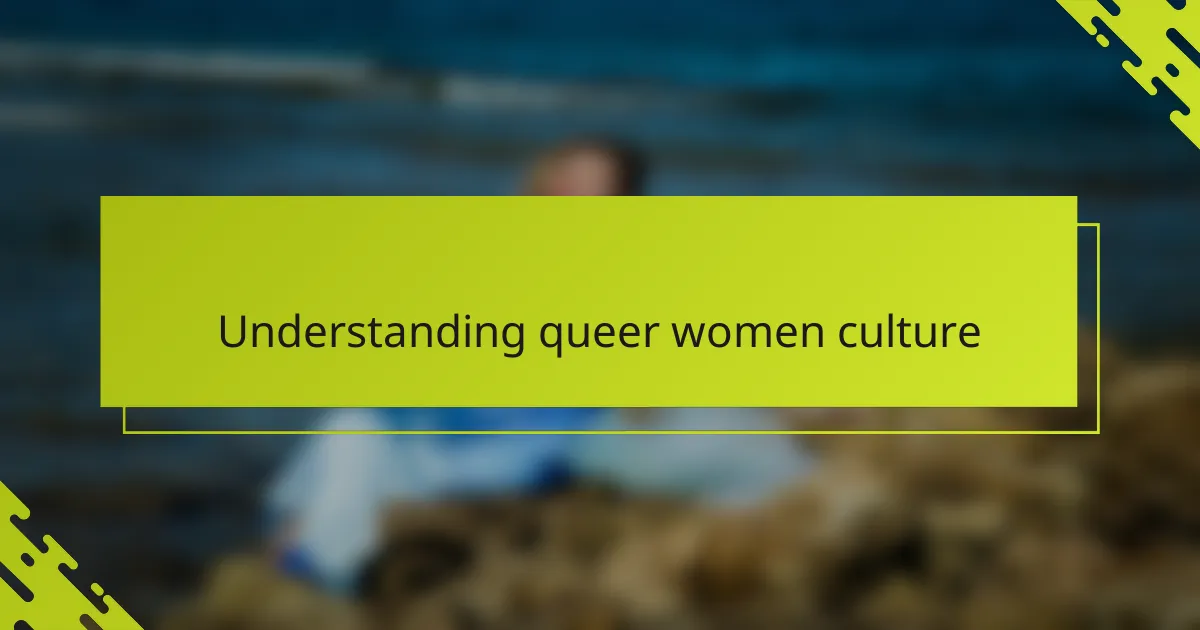
Understanding queer women culture
Queer women culture is a vibrant tapestry woven from diverse experiences and identities, full of resilience and creativity. When I first immersed myself in this community, I was struck by how openly people express their authentic selves, challenging norms with pride and vulnerability. Have you ever noticed how this culture not only celebrates difference but also creates a strong sense of belonging despite society’s pressures?
For me, understanding queer women culture meant learning to listen deeply—beyond labels and stereotypes—to hear the stories and struggles that shape our shared identity. It’s in the laughter at queer-themed gatherings, the quiet support during tough times, and the bold activism that demands visibility and rights. These moments taught me that queer women culture is not static; it’s alive and evolving, just like the people who live it every day.
Engaging with this culture also opened my eyes to the intersections within our community—how race, class, and gender identity intersect to create unique challenges and strengths. I often reflect on conversations where someone’s vulnerability showed me the depth of our collective resilience. Isn’t it remarkable how queer women culture fosters both fierce independence and profound solidarity?
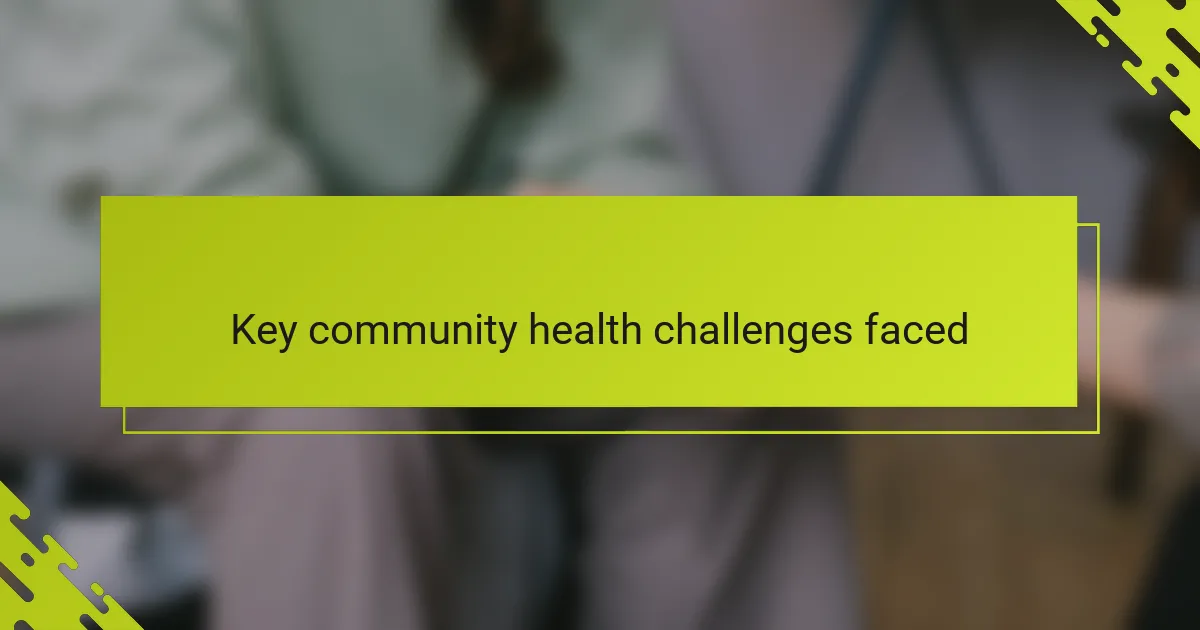
Key community health challenges faced
One of the toughest challenges I noticed in community health was the persistent invisibility many queer women face in healthcare spaces. Have you ever felt like your identity was erased or misunderstood by professionals sworn to help you? That erasure isn’t just frustrating—it can be dangerous when it leads to inadequate care or outright discrimination.
Mental health struggles also run deep here, often tied to experiences of stigma and isolation. I remember a friend sharing how hard it was to find counselors who truly understood her intersectional identity. It made me realize how critical culturally competent support is, yet how scarce it remains.
Additionally, access to preventive care remains uneven, especially for those juggling multiple marginalized identities. How do you navigate a system that feels designed for someone else entirely? This question kept haunting me, pushing me to advocate for better resources and inclusion within community health initiatives.
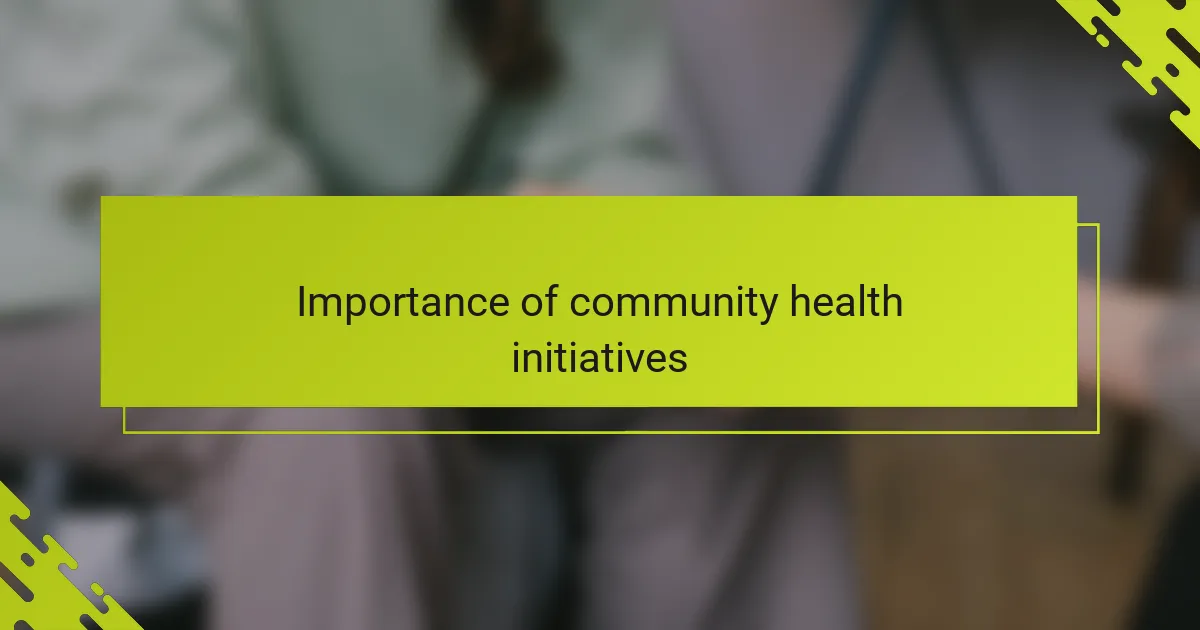
Importance of community health initiatives
Community health initiatives matter because they create spaces where queer women can finally see themselves reflected and respected. I recall attending a local health workshop where, for the first time, questions about my specific needs weren’t just heard—they were prioritized. Isn’t that what genuine care should feel like?
These initiatives also help bridge the gaps that traditional healthcare often misses. When I volunteered at a queer health clinic, I witnessed how tailored support transformed anxiety into empowerment, reminding me that inclusion isn’t a bonus—it’s essential.
Moreover, community-driven health efforts build trust and connection that no sterile hospital room can replicate. Have you noticed how healing often starts when you’re surrounded by people who truly get your story? That’s the power community health brings, stitching wellness into the fabric of our lives.
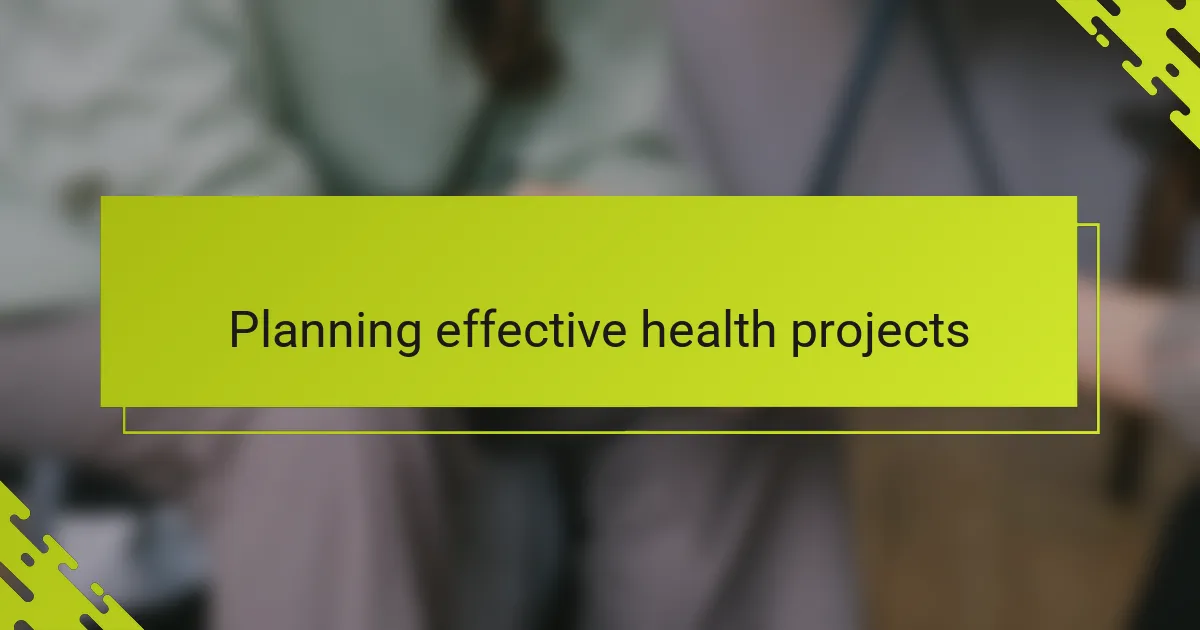
Planning effective health projects
When I began planning health projects for queer women, I quickly learned that effective initiatives start with listening—not just hearing, but truly understanding the community’s needs. Have you ever tried to design something for others without asking them what matters most? That disconnect can doom even the best intentions.
Setting clear, achievable goals became my compass. I found it helped to break down complex issues into smaller steps, making progress feel tangible and motivating everyone involved. For example, focusing first on mental health support allowed us to build trust before tackling broader challenges.
Another key lesson was the importance of flexibility. Health projects can’t be rigid because people’s lives and needs shift constantly. I remember a time when we had to adjust our outreach methods halfway through because what we thought would work simply didn’t resonate. Being open to change made all the difference in staying effective and connected.
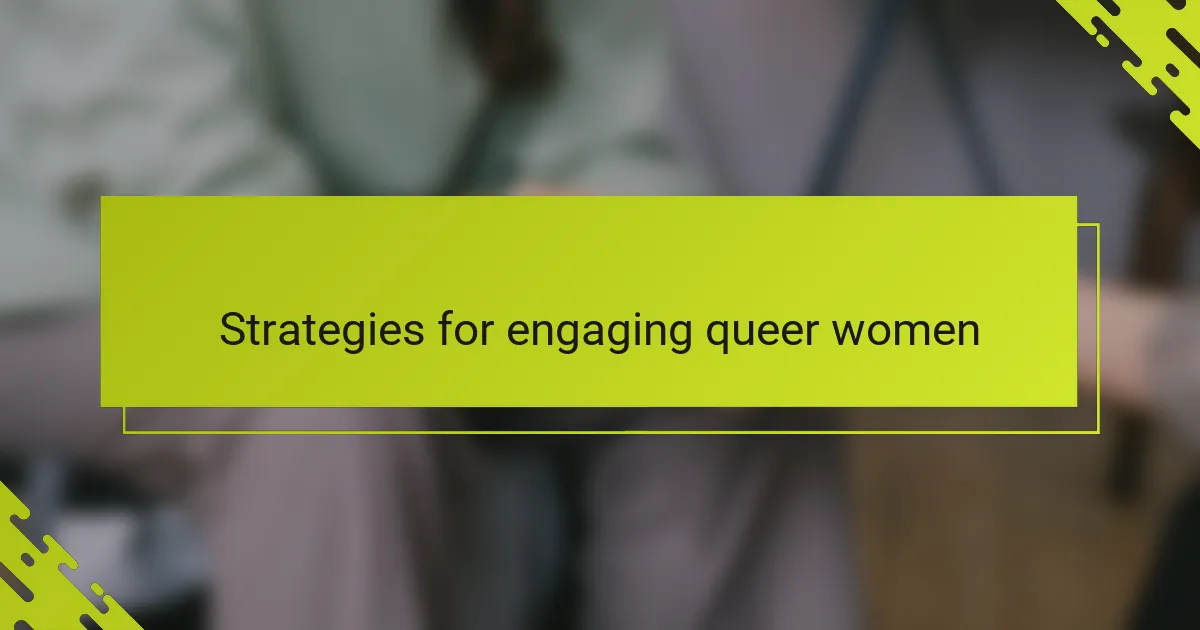
Strategies for engaging queer women
Connecting with queer women in health initiatives requires more than just outreach—it demands genuine relationship-building. When I started, I made it a point to attend community events and listen without an agenda, which helped me understand what mattered most. Have you noticed how trust grows when people feel seen and heard on their own terms?
I found that embracing intersectionality was key. Queer women’s experiences aren’t one-size-fits-all, so tailoring strategies to honor race, class, and identity differences made the engagement feel authentic. For example, hosting small, informal gatherings allowed space for stories that might otherwise remain silent in larger settings.
Lastly, creating safe, affirming environments was non-negotiable. I recall when a simple choice—offering gender-neutral restrooms—sparked relief and gratitude, signaling that this space truly belonged to everyone. Isn’t that the kind of detail that shifts participation from hesitant to wholehearted?
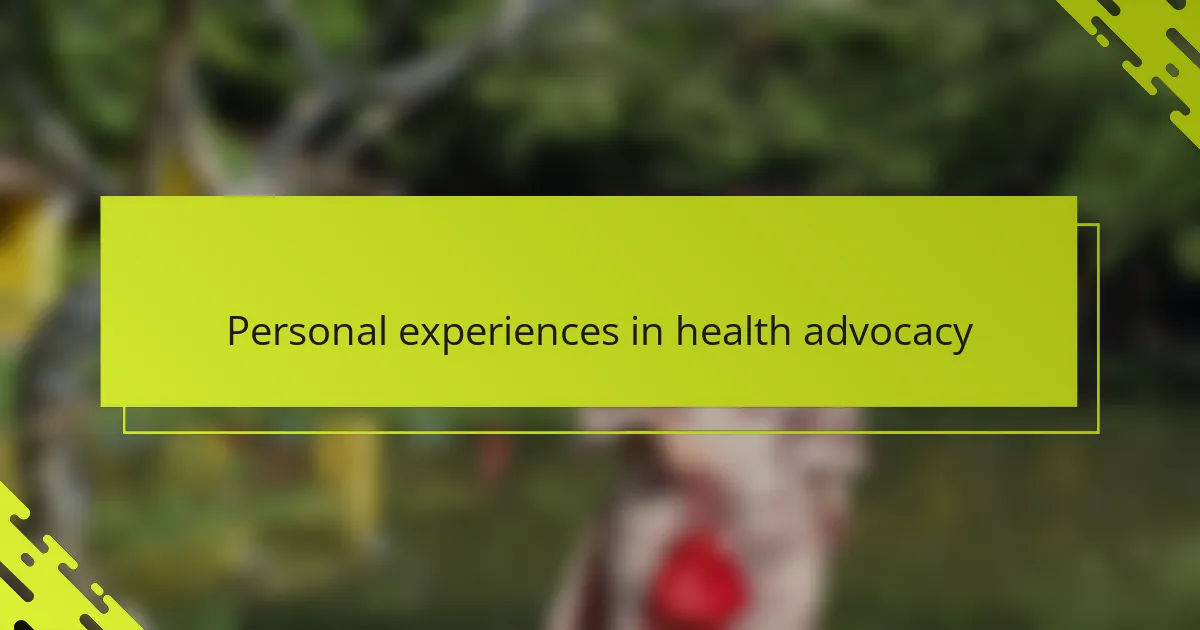
Personal experiences in health advocacy
In my early days of health advocacy, one moment that stands out was when a queer woman confided in me about her struggles navigating a healthcare system that seemed systematically unprepared for her identity. Hearing her story wasn’t easy—I felt the weight of the gaps we needed to fill. Have you ever been moved by a single story that suddenly made a large problem feel urgent and deeply personal? That encounter fueled my commitment to speak up and create spaces where such experiences are not just acknowledged but addressed.
There were times when advocating felt isolating, especially when I encountered resistance or misunderstanding from institutions. Yet, each small victory—a clinic adopting more inclusive language, a community workshop addressing mental health—reminded me why persistence matters. I sometimes wonder: what keeps someone going when the challenges seem so entrenched? For me, it’s witnessing the gradual, meaningful change in individuals who feel seen and supported for the first time.
One of the most powerful rewards in this journey has been the relationships forged with queer women whose resilience and honesty continually inspire me. In those connections, advocacy becomes more than a task; it becomes a shared mission, fueled by empathy and hope. Have you noticed how real change often starts through human connection rather than policies alone? That’s the heart of health advocacy for me—a collective effort rooted in listening and care.
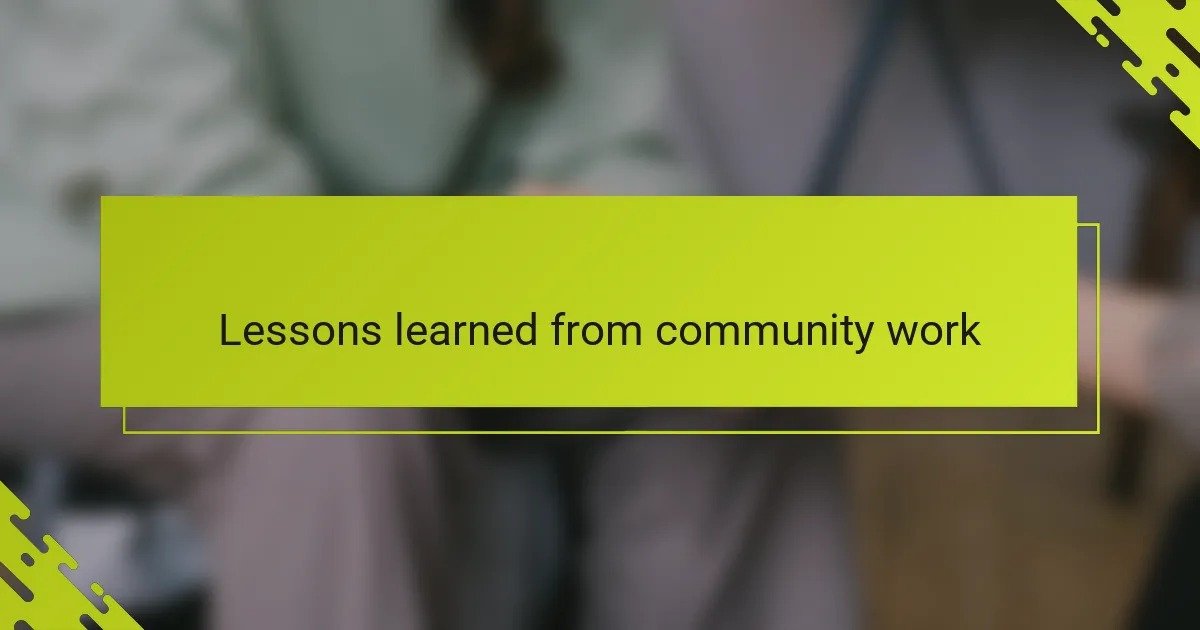
Lessons learned from community work
Community work has taught me that patience is not just a virtue—it’s a necessity. Progress often feels slow and sometimes invisible, but I’ve learned to celebrate the small wins that ripple through the community. Have you ever noticed how a single act of kindness or understanding can build momentum in ways you never expected?
Another lesson I carry with me is the importance of humility. Coming into community health initiatives, I thought I had answers, but quickly realized that listening deeply to lived experiences was far more valuable. Isn’t it humbling when you realize that the people you aim to serve hold the real expertise about their own needs?
Finally, I discovered that resilience in community work isn’t just about enduring challenges—it’s about adapting and growing alongside the people you serve. There was a time when a project I was passionate about had to pivot completely due to unforeseen barriers, and though it was frustrating, that flexibility allowed us to connect more meaningfully in the end. What’s your experience with turning setbacks into opportunities? For me, those moments define the heart of community health initiatives.
